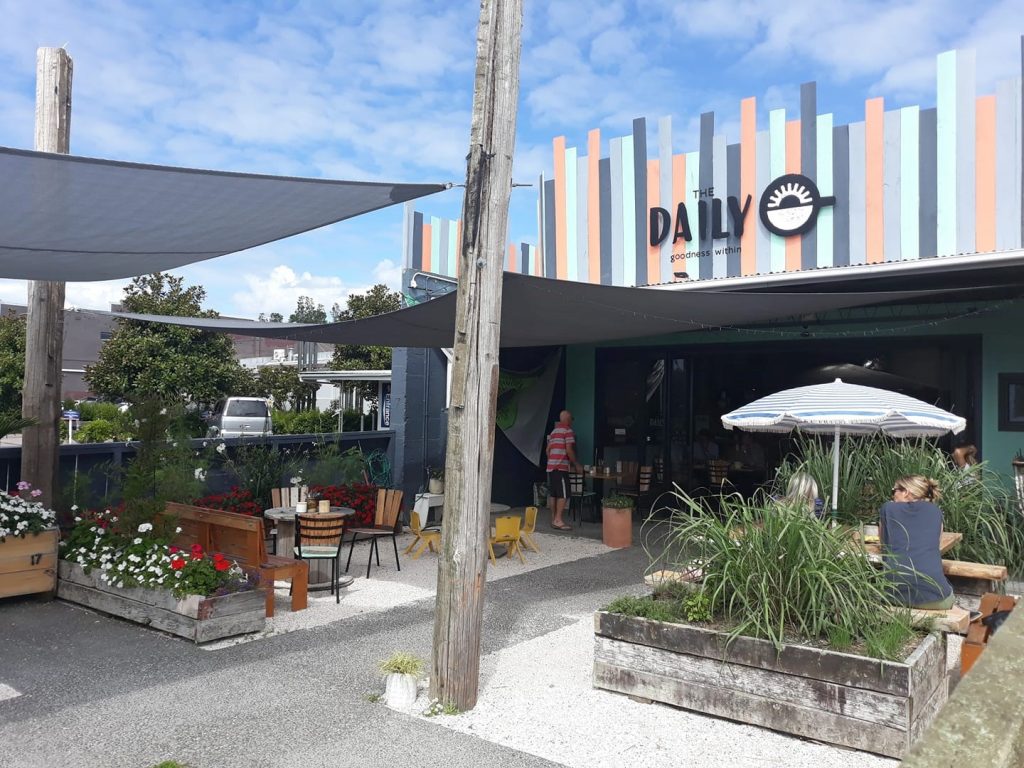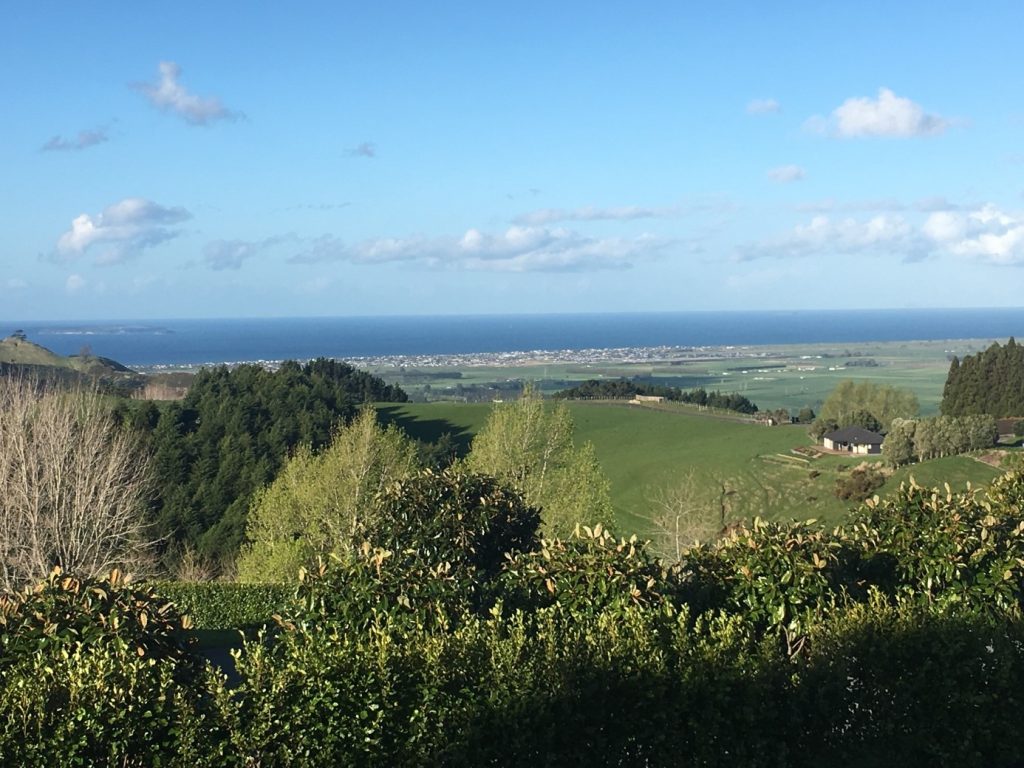Liberal Arts in Practice is an experiential learning opportunity, a learning paradigm that requires openness to new ways of thinking. I wanted to travel, to gain experiences, push boundaries, understand cultures through time and space, challenging my perception and acquire new knowledge. I wanted to learn more about how western culture have been cultivated here in Aotearoa/New Zealand and about the impact that colonization has had on this country. I wanted to learn more about how humans provide for each other and put my Liberal Arts intellectual and practical skills at test.
So, who am I? My name is Jessica and I study Liberal Arts at The Department of Philosophy, Linguistics and Theory of Science at The University of Gothenburg, Sweden. Here in Aotearoa/New Zealand, at ‘The Daily-goodness within’, where I am currently doing my practical work, they call me Jess. It is nice to be called Jess. There is something familiar and inclusive in this manner.

The Daily is not an ordinary café. The Daily cafe is part of the organization, run by The Search Party Charitable Trust, which is a registered charity that focuses on giving back, with all profits from the café going to the local Te Puke community, with the purpose of alleviating poverty and breaking the cycle of isolation. This is done through various initiatives, such as community and crisis meals, lending a helping hand, cooking classes and training. There are free pizza nights and once a month, the cafe is transformed into a communal kitchen making cottage pies that are then available as crisis meals, promoting acts of goodness to grow there and within. Even the coffee beans used at The Daily Café focus on giving back, where every coffee sold provides one week of fresh water in Cambodia through the Trust. It is an award-winning café, run with a not-for-profit ethos, meant to work as a community asset.
The Daily Café is located in Te Puke, a town 28 kilometers southeast of Tauranga, in the Bay of Plenty of New Zealand. It is a town that markets itself as `Kiwifruit capital of the world´ and home to just under 10,000 people. Agriculture is the backbone of the district’s economy.

New Zealand, with its beautiful nature, with fjords, mountains and bushes and magnificent landscapes, wonderous beaches, vast, empty and endless have been struggling with another form of isolation – mental health issues – depression and suicide. The country has by far the highest youth suicide rate in the developed world according The Unicef, and their recent study found New Zealand’s youth suicide rate – teenagers between 15 and 19 – to be the highest of 41 OECD and EU countries. The high suicide rate ties in with other data, showing child poverty among other social inequality. The statistics also reveal that suicide rates are highest for young Maori and Pacific Islander men, which indicates that there are issues around cultural identity and an impact of colonization. Other concerns are the epidemic level of substance abuse, where it is estimated that 4% of the population are abusing the drug methamphetamine. The Search Party charitable trust wants to overcome and break this cycle of isolation and they do so by offering a place where people can meet, connect and share a space, as well as through several initiatives funded by the café´s profit, such as The Food Project – where they teach people and encourage healthy and affordable meals, The Daily Lift- school bus service provided for people that don´t have the possibility to take their children to school, Empowerment – food back, to name a few.
Politeness is the flower of humanity
–Joseph Joubert
My practical work at The Daily includes being part of the café when it operates, and then creating initiative to further grow the business and their vision, such as a free library, helping to finetune processes and organizing their work space. I do so by spending time with staff, working side by side, while hearing why they work there. It is about finding a common ground to why they were drawn to work at the Daily to be able to further improve their healthy culture of honor and excellence. I have beenentrusted with staff ie interviewing staff and utilizing this information as feedback to management to sustain and further grow the business. Throughout the liberal arts education, we students have learned about the complexity of human behavior, which has given us an interpersonal perspective on various things, an understanding of the world and its people. It is an awareness that is valuable in every field, an important part to be able to create a space to connect in trust and with credibility. Interpersonal relations in collaboration are important elements of an effective team process. When working consciously by cultivating the capacity of interpersonal relations, through trust, communication, creative problem solving, decision-making, and conflict management successful outcomes can be established. The intention from management is that there should be no hierarchy in the work place, that one speaks kindness and love. The culture is clear: we are to build people up, rather than breaking them down by snapping and uttering harsh deadly words. Real-life experience in hospitality operations that I participate in is vital for a career in this field, but so are courses in conciseness, languages and culture studies as well as the insight I gained about human psychology during my course of studies. Work and society, and how they interact, are major components of the discussions around the future of work. These are dynamic and complex.
Hospitality is an important part of my practical work, and I have, since I first came to NZ been surprised by the great service that is provided where ever one goes. Why is it that people are so generous in hospitality here? To understand this, one must follow up on cultural norms and ethics. A basic understanding of Māori customs and protocol -tikanga is crucial to any understanding here. Manaakitanga is all about hospitality and kindness. It sums up the act of welcoming and looking after guests, by offering hospitality, generosity and mutual respect, everyone involved comes out better off. The concept is important to many New Zealanders and is recognized by the New Zealand Government as one of the two core values of tourism strategy.
Questions that come about while contemplating on my practical work and my daily life here in Aotearoa/New Zealand is whether or not tourism is terrorism? While tourism is good for economic growth it also increases social inequality and have a huge environmental impact. I believe that the crisis we are facing share a common root cause: economic globalization. The global economic system commercializes every aspect of the world around us, destroying the natural world, livelihoods and our well-being. How does one alleviate from poverty while still participating in the economic system?
Warmest Jess


